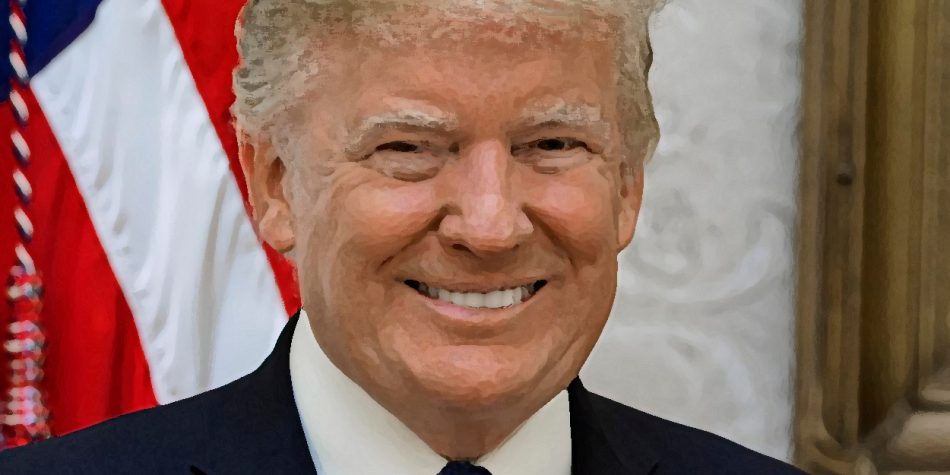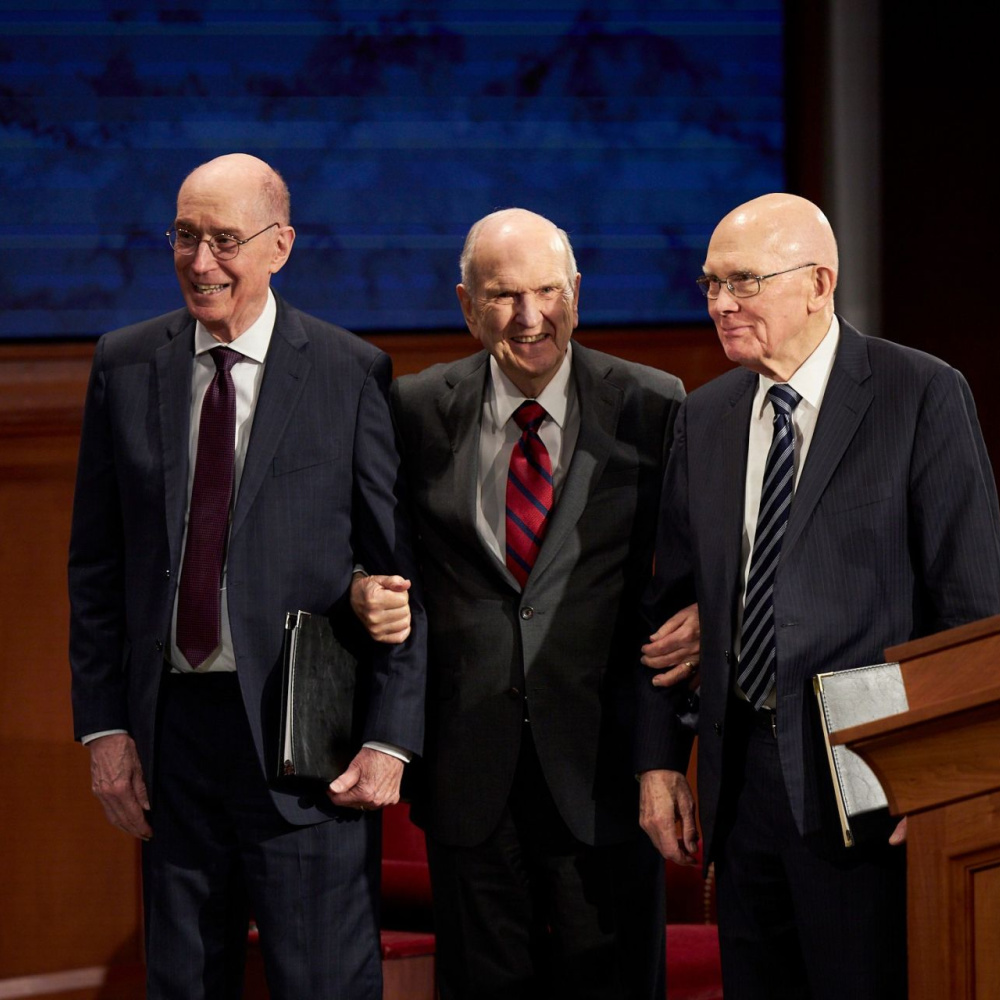Almost exactly four years after the New York Times ran a similar story, this week the world’s leading newspaper published an argument about how Latter-day Saints, once again, could prove decisive against Donald Trump at the ballot box next week.
This rejection of Donald Trump by both prominent and rank and file Latter-day Saints has been a stand-out theme throughout the media coverage of Trump’s presidency.
While almost no presidential polls ask about religion, this overall storyline almost certainly has some truth. Both using the intermountain west as a barometer and through long experience being deeply ingrained in this faith community, it’s clear to me that the overwhelming partisan lean towards Republicans among Latter-day Saints has not extended to Donald Trump.
But this solitary overplayed observation makes up only one part of a rather complicated picture of the relationship Latter-day Saints have with Donald Trump, highlighted by Supreme-Court-short-listed Latter-day Saint Senator Mike Lee comparing Trump to Latter-day Saint scriptural hero Captain Moroni this week.
The story goes back at least as far as 1986 when Stephen Hyde, a soft-spoken Latter-day Saint who cut his professional teeth managing Vegas Casinos for Steve Wynn, left to lead Donald Trump’s operations in Atlantic City. In their book “Trump Revealed,” Michael Kranish and Marc Fisher quote former colleagues as saying that Stephen Hyde “may have been the only person Donald truly trusted . . . as close a friend as Trump ever had.”
Those in the Trump organization at the time described Hyde as being able to “anticipate Trump’s moods.”
But their friendship ultimately proved to be short-lived, since Stephen Hyde died in a tragic helicopter accident in 1989. And while Trump would continue to call the late Steve Hyde his “great friend,” as the fortunes of his casinos began to drop he wasted no time in assigning blame to Hyde’s previous management.
Donald Trump’s relationship with the faith came to light again during his first campaign for the presidency. He sat down with then-senior political writer for BuzzFeedNews and Latter-day Saint McKay Coppins for an interview. During the interview, Trump suggested that Romney did not win in 2012 because his faith was “alien.”
Coppins spoke up to explain that he too was a member of the Church. And Trump’s demeanor immediately changed. “You know,” he said, “people don’t understand the Mormon thing. I do. I get it.”
But Latter-day Saint politicians were wary of embracing Trump, legitimately afraid that their own family-friend persona would be diminished by embracing him. It can be hard to remember just how unlikely Trump’s election seemed to the political class in the summer and fall of 2016, even after he secured the Republican nomination. As their party’s new standard-bearer, those who were currently in office largely avoided criticizing him. But Mitt Romney, the nation’s most prominent Latter-day Saint politician (but not currently then in office) took a very different tack, calling Trump out as “a con man, a fake” in a searing speech that made national news.
Latter-day Saints’ discomfort with Trump and his opponent was so pronounced that a third-party candidate Evan McMullin announced a run for president almost exclusively to appeal to those votes.
But while Latter-day Saints may have felt discomfort, in public at least, Donald Trump became ever more effusive with his praise. In a rally in Salt Lake City, Donald Trump loudly announced, “I love the Mormons.”
He went on, “I’ve had many Mormons work for me and they give to the church and they constantly give. Sometimes I make the payment directly to the church. They say they don’t want to be tempted by keeping the money.”
But when a crass audio recording of the President bragging about sexual assault came to light, many Latter-day Saint politicians had too much, publicly distancing themselves from the president even in the final weeks of the presidential election. The trend was so visible that some pundits even suggested that Utah might not vote for the Republican candidate for the first time since 1964.
But in the waning days, all that consternation seemed to collapse. Jason Chaffetz, the most prominent Utah House Representative at the time, re-endorsed Trump less than two weeks before the election. And Trump won Utah by the fewest points of any president in recent election history (but still by eighteen percent).
And to the surprise of many, Donald Trump won the presidency.
Trump’s victory played an important turning point in his relationship with Latter-day Saints. In his essay in “Contingent Citizens,” J.B. Haws details how in the mid-twentieth century for the first time Latter-day Saints “gained access to ‘first-class citizenship.’”
The history of this hard-won acceptance weighs heavily in the Latter-day Saint political determinations. And with such limited influence in the Democratic party, were Latter-day Saints to maintain their political influence it would now need to be through Donald Trump.
Mitt Romney very publicly stepped back his criticisms of the then-president-elect in a possible effort to work with the administration. Senator Mike Lee fully embraced the President. In a recent statement, he said, “I genuinely like him on a personal level.”
And the Latter-day Saint politicians who did not embrace him largely left: Jeff Flake, Dean Heller, Mia Love.
In a more symbolic display, the Tabernacle Choir was invited to perform at the presidential inauguration and chose to perform in spite of fierce criticism.
And while these often contradictory signals constituted much of the public narrative, behind the scenes several Latter-day Saints have played a crucial role in the Trump administration, even in a similar role that Stephen Hyde played with Trump so many years earlier.
Most prominent among those may be Robert O’Brien. Today he is the first person Donald Trump calls in the morning, and the last he calls before bed. He began his work in the campaign as a Special Presidential Envoy for Hostage Affairs. And with the President’s well-known attraction to celebrity, it was certainly no small thing that the President personally chose O’Brien to attend the highly publicized murder trial of rapper ASAP Rocky in Stockholm. He quickly rose in the administration, and today serves as the National Security Advisor. O’Brien has gone beyond the ordinary confines of his role, to actively campaign for his boss’ reelection in key swing states.
The Chair of the Republican National Committee, Ronna McDaniel has also fully embraced the president—defining the Republican National Committee under her leadership almost entirely by its support for him. And McDaniel’s support has extended beyond the merely political. She dropped her middle name “Romney” from her professional name in what the New York Times describes as “apparent deference” to the President’s ongoing conflict with her uncle.
And these are only a few of the Latter-day Saints that President Trump has embraced (and who have embraced him back) while serving in his administration, from Gregory Smith, the Deputy Director of Political Affairs, to Jon Huntsman who served as an ambassador to Russia, to Jody Olsen, director of the Peace Corps.
And during this time, his son Donald Trump Jr.’s interest in the Church has become so keen, that some have speculated he may even be interested in converting!
Yet while these personal relationships blossom, reports have continued to come that in private the president mocks people of faith in general and Latter-day Saints in particular, with one report suggesting he’s mocked garments.
Which brings us back to Mike Lee’s recent statement comparing the President to Captain Moroni. In a later clarification of his remarks on Facebook, the Senator elaborated:
The point I was trying to make (however awkwardly) was…after working with and getting to know President Trump over the last four years, I now see him in a very different light than I did in 2016. . . . I have come to the conclusion that he has “s[ought] not for power, but to pull it down.” Translating Captain Moroni’s language into Donald Trump’s, he has relentlessly tried to “drain the swamp.”
With the increased divisiveness of the Republican ticket among Latter-day Saints, this comparison was sure to draw much-deserved criticism among faithful Latter-day Saints. But for those many other Saints who have embraced the president, the comparison seems apt. As righteous as Captain Moroni was, he was also impetuous and at times ill-tempered. But he ultimately got the job done, just as they believe Trump has.
In sum, it is certainly true that Latter-day Saints have rejected and opposed Donald Trump in ways unique to their history with past Republican Presidents, but ultimately that makes up only one part of a much larger story of the President’s relationship with the faith and its members.

















